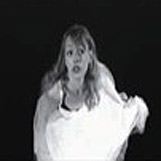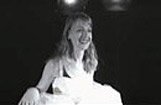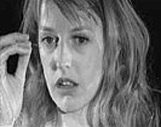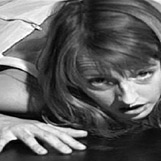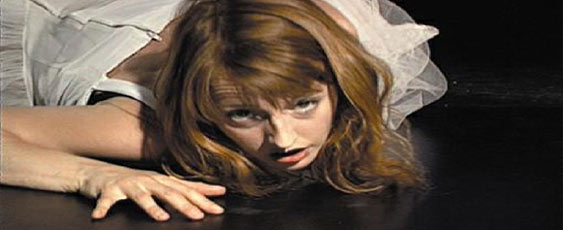
Practitioner Voices: Beatrice Allegranti
Interviewed September 2004 by Becca Gill as part of the Total Theatre Explores research project.
Beatrice Allegranti, BA (Hons) Dance, MA DMT SRDMT is a performer/choreographer,
senior registered dance
movement therapist and visiting lecturer at the Roehampton University,
Division of Arts Therapies and Dance Department and more recently at the Institute of Dance and
Movement Psychotherapy in Warsaw, Poland.
Her extensive clinical experience includes group and
individual work for the NHS in mental health, as well as staff consultancy and private practice.
Specialist area of interdisciplinary research is 'the performance of gendered identities' and this
is manifest in international solo dance/theatre performances, collaborative film projects,
therapy/performance labs, publications and conference presentations. Over the past decade, many
of these performance works and creative projects have received financial assistance from Arts
Council England.
Beatrice has recently been awarded a scholarship to undertake a three-year
practice-based doctorate at Roehampton University which weaves a tripartite connection between
Choreography/Performance, Dance Movement Therapy and Feminist Psychotherapy.
How do you describe your artform practice?
Interdisciplinary, in a word. I practice as a dancer/performer, and choreographer. I'm also a dance movement therapist and at the moment that's something I'm researching for my practice-based PHD.
My practice is interdisciplinary in the sense that I am weaving feminist psychotherapeutic models, dance movement therapy models and performance models. The emphasis is on addressing marginalised social gender issues, assumptions and prejudices.
How do you describe your work? You have described the areas that you work in and your approach, but how do you describe the body of work you create?
Again, if I'm looking at the deep interconnection between dance and dance movement therapy there are various outcomes along the process. I consider it one long process. It depends on context but I create solo performances as well as running performance therapy labs, these labs are attended by arts and therapy professionals.
The labs also have a component of open practice where people can come and see what is going on. The performance is live, video work, film and writing which manifests from this work. I think I would describe my work as 'political movement' (in dance theatre/therapy/education).
What are your main areas of inspiration and do they change with each project?
Life is my main area of inspiration! I am really fuelled by a desire to create some kind of change, social change, change in terms of perception of duties and roles within society, change in terms of psychophysical health. I'm inspired by other people's practice in many forms, by reading, by music. I am also very inspired by aspects of psychotherapeutic thinking.
Does gender matter in performance?
Yes hugely, my practice-based PhD is about the performance of gender within everyday life and in performance. I'm very interested in the performance of gender in personal and public spheres and the relationship and reciprocity of the two.
How do you actually approach that as a practical area of work, how do you approach working with gender?
First of all I hold an awareness that the body is gendered and the dialectical process of the body is both personal and public and gendered, you can't get away from that fact. So with my gendered body I am working with aspects that are particularly marginalised about my gendered identity as a woman in society. On a very practical level I work with what unfolds in the studio - and to a certain extent every story, every text, every narrative, the body as text, is gendered.
Gender is always at the forefront of my awareness; I don't have to search, it is just here. Also, when I work with other people in my labs there is a group interest or awareness of the roles of men and women in artistic practice and in life.
Do you work with both women and men in that context?
Yes, equally - and that is something I am committed to, that balance, that equality, promoting or encouraging some kind of transformation or change at least, for women as well as men.
Does your body determine the work you make or the way in which you make it?
It is not so much that there is my body and there is me, as two separate entities. Here I am, working towards an integrated whole. For me, it's about working consciously with my body and looking consciously and with awareness also means paying attention to the unconscious processes.
Would you consider your artistic priorities to be different to those of men?
How would I know? Which man? Context is important as is taking each individual into consideration. For example, I work collaboratively with a man, an American filmmaker who is twenty years my senior, a heterosexual male. We worked on a film project together where I choreographed and conceived the work and he was the filmmaker.
Yes, our approaches were very different but also very enriching, but one of the key areas in order to sustain the work was an issue about co-creation at every level and open dialogue at every level, which I had to push for. However, that was just one experience.
How would you define feminism?
In a multiplicity of ways. Feminism for me is about social justice, equality, the recognition and valuing of women's and men's positions as equal. As a woman, it is hard not to pay attention to personal and political issues for women's rights in society; of a voice, of equality, of deconstructing hierarchies, of acknowledging the subjective, or internal psychological processes and placing that in the social context. I don't know any other way, I didn't suddenly think I am a feminist - I am a woman. I'm interested in language as well, so I'm not afraid of the term feminism.
According to your own definition, what does feminism mean in relation to yourself and your work?
I think it has a huge impact on my work. I am a woman first of all, women's histories, her-stories, have a particular place, so it shapes my thinking, I guess I would say my work is about social intervention as much as my therapy is about making interventions. As an artist I have an ethical stance and this is influenced from my position as a feminist and as a therapist.
Do you feel that the word feminism has shifted in meaning?
Yes it has and the initial backlash was important. We need a revolution to create change, whether it's a personal revolution or a cultural revolution. It has formed the possibilities for women as we are now, in art, in society, so yes. I love the term 'parafeminism', not postfeminism but parafeminism...
Do you think that theatre can effect social change?
Yes, undoubtedly
How would you define the effect of the funding system on women's performance work?
It has felt as if I have had to knock on doors of the public funders for some years before I actually had any kind of recognition. One thing I have learnt in terms of applications is how to describe myself and the work I create with a sense of importance to funding bodies whilst still remaining true to my beliefs. I think it is a game, funding is a game that I am learning to play.
What do you see as the biggest problem facing women in performance today?
I think there are many things to problematise that are grist to the mill in terms of content. I don't think that personally there are problems facing me as a woman performer. I play a lot on the notions of seeing and being seen, and inviting myself to being seen, and inviting the audience into seeing themselves; all of these reciprocal processes are key to the therapeutic relationship as well, which is great material to work with.
What from your perspective is the future for women within performance?
Huge question! I feel that there is sense of a deeper acknowledgement and self-evaluating of women and by women which has created more possibilities to go out there and do the work and not be defined by hierarchical and possibly restricting systems which exist within the arts.
The future for women in performance is surely to continue to create our own definitions as a way forward and to keep evaluating and articulating that physically, emotionally and verbally.
Voices:

